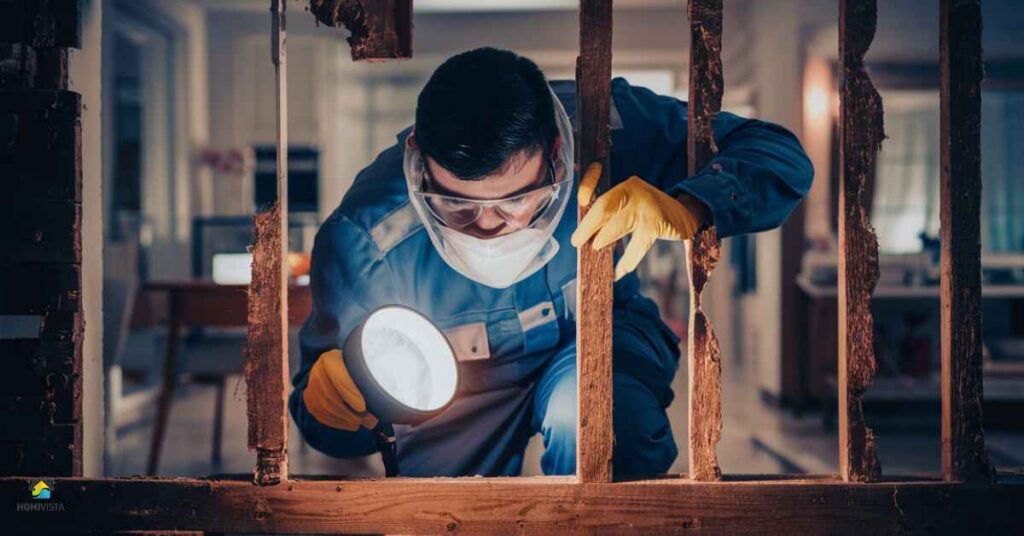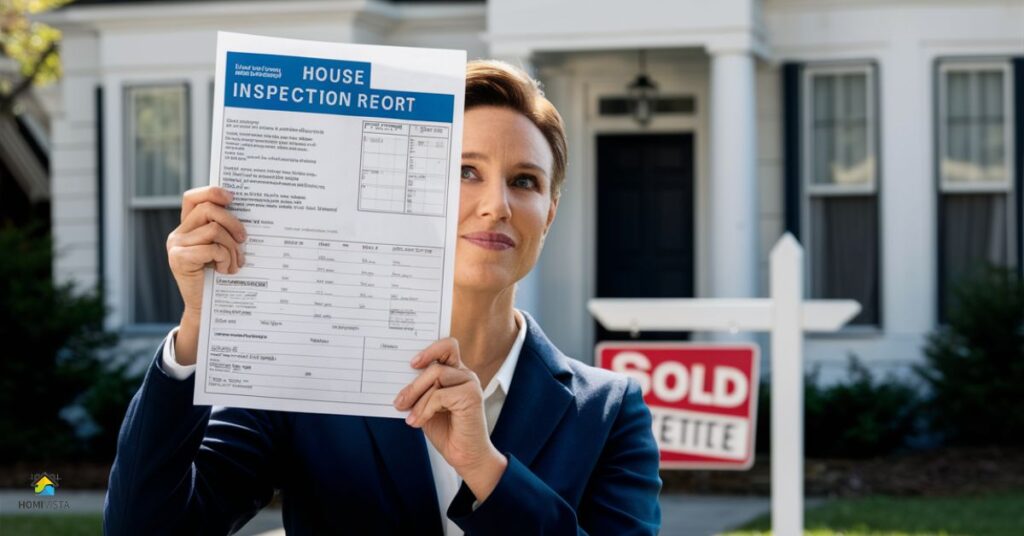When you have a home inspection, it’s crucial to understand the timeframe the report is valid for. Usually, the inspection is valid throughout the sale process. This means that the report is current from the time of the inspection until the sale is completed.
However, it’s important to note that the duration of validity can differ depending on local laws and the terms of the real estate agreement.
What Is a Home Inspection?
It is important to have a home inspection done when you are buying a house. This involves a close look at the condition of the property by experts who check everything from the structure to the plumbing and electrical systems. They will also inspect the roof and other important components of the house to find any issues or safety concerns.
The inspection report will detail their findings, which will help you make an informed decision about purchasing the property. This process is vital for discovering any hidden problems and getting a complete picture of the property’s overall condition, which will make the home buying process smoother and more transparent.
The Importance of having a home inspection
Having a home inspection is important for both buyers and sellers. Buyers can uncover any potential issues or safety concerns, which helps them make informed decisions and negotiate effectively. It also gives them a better understanding of the property’s condition, so they won’t be surprised after buying.

Sellers can benefit by addressing any problems early on, making their property more attractive to buyers and reducing the chances of deals falling apart. In the end a home inspection promotes transparency, reduces risks and leads to a more seamless real estate transaction for everyone involved.
How often to have your home inspected
Frequency: Generally, it’s recommended to have a home inspection every 3-5 years.
New Home: Get an inspection before buying or within the first year of owning a new home.
Aging Homes: Older homes may benefit from more frequent inspections, perhaps every 2-3 years.
Major Renovations: After significant renovations or additions, schedule an inspection to ensure everything is up to code.
Change of Ownership: Whenever the property changes hands, consider a thorough inspection.
Environmental Concerns: Inspect for environmental hazards like mold, radon or pests regularly.
Preventive Measure: Regular inspections catch issues early, saving costs on major repairs.
Insurance Requirement: Some insurance companies may require inspections at specific intervals.
Local Regulations: Follow local guidelines or regulations regarding inspection frequency.
Personal Preference: Depending on your comfort level or suspicion of problems, you may choose to inspect more frequently.
Read this blog: I Make $70,000 A Year How Much House Can I Afford
Why Get a Home Inspection, when it has a Short Validity Period?
A home inspection is essential despite its brief validity period, which usually ends when the sale is completed. It offers a valuable overview of the property’s state, aiding buyers in making well-informed choices and discussing necessary repairs or modifications.
Furthermore, it reveals potential safety risks or significant problems that may not be obvious during a casual inspection. In conclusion, a home inspection plays a vital role in the home purchasing process.
How Long Does a Home Inspection Take?

A home inspection duration varies based on factors like the property’s size, age and condition. On average, inspections take 2-4 hours. Larger or older homes may require more time, while smaller or newer properties may be quicker.
The inspector meticulously examines key areas, such as the roof, foundation, plumbing, electrical systems and more. However, the thoroughness of the inspection is crucial, regardless of the time taken.
Type of house inspection
There are several types of house inspections, each focusing on different aspects of the property. Here are some common types:
General Home Inspection: A comprehensive examination of the overall condition of the property, including structural elements, systems (like HVAC and plumbing), appliances, and safety features.
Pre-Purchase Inspection: Conducted before buying a home to identify potential issues and assess the property’s condition.
Pre-Listing Inspection: Done by sellers before listing their property to address any issues upfront and increase marketability.
Specialized Inspections: These may include termite inspections, radon testing, mold inspections, electrical inspections, or roof inspections, focusing on specific concerns or hazards.
New Construction Inspection: Ensures that newly built homes meet quality standards and building codes.
Warranty Inspection: Done before a builder’s warranty expires to identify any issues covered under the warranty.
Termite Inspections

Termite inspections are crucial for assessing the presence of termites or termite-related damage in a property. Here’s more about them:
Purpose: Termite inspections aim to detect the presence of termites, wood-destroying insects or signs of termite damage in a building.
Importance: Termites can cause significant structural damage if left unchecked, making inspections essential for early detection and prevention.
Process: A licensed inspector examines the interior and exterior of the property, focusing on areas prone to termite activity such as wooden structures, crawl spaces and basements.
Detection Methods: Inspectors use various tools like moisture meters, thermal imaging cameras and probing devices to identify termite activity or damage.
Report: After the inspection, the inspector provides a detailed report outlining any termite activity, damage observed and recommendations for treatment or mitigation.
Frequency: Termite inspections are typically recommended annually or as part of regular home maintenance to ensure early detection and prompt treatment if needed.
Is It Worth It for the Seller to Get an Inspection?
Having a home inspection as a seller is a smart decision. It allows you to find any problems early on so you can fix them before listing your home. This can make your property more attractive to buyers and make the selling process easier.
It also shows buyers that you are honest and trustworthy, reducing the chance of unexpected issues later on. In general, getting a pre-listing inspection is a good idea for sellers.
Reasons why should get an inspection:
Here are several reasons why getting a home inspection is beneficial:
Identify Issues: Inspections reveal potential problems or safety hazards in the property.
Informed Decisions: Buyers can make informed decisions based on inspection findings.
Negotiation: Inspection reports can be used for negotiating repairs or price adjustments.
Prevent Surprises: Avoid unexpected expenses or issues post-purchase.
Safety: Ensure the property meets safety standards and codes.
Peace of Mind: Have confidence in the property’s condition and investment.
Compliance: Verify that renovations or additions comply with regulations.
Insurance: Some insurance companies may require inspections for coverage.
Long-Term Maintenance: Identify maintenance needs for future planning.
Legal Protection: Protect against undisclosed defects or liabilities
How to Pick a Home Inspector

Here’s a concise guide on how to pick a home inspector. These criteria can help you find a reliable and competent home inspector for your needs:
Credentials: Look for licensed and certified inspectors with relevant training.
Experience: Choose inspectors with a solid track record and experience in the industry.
Reviews: Check online reviews and testimonials from previous clients.
Sample Reports: Request sample inspection reports to assess thoroughness and clarity.
Cost: Compare prices but prioritize quality and expertise over lower costs.
Availability: Ensure the inspector can accommodate your timeline and schedule.
Communication: Choose an inspector who communicates clearly and answers your questions.
Specializations: Consider inspectors with expertise in specific areas if needed, such as termite inspections or environmental testing.
How Much Does a Home Inspection Cost?
The price of a home inspection can fluctuate based on various elements like the size and location of the property, the intricacy of the inspection, and the inspector’s expertise and credentials. Typically, home inspections can cost anywhere from $300 to $500 or above.
Additional services like termite inspections, radon testing, or mold inspections may result in additional fees. It is crucial to obtain estimates from several inspectors and take into account their skills and standing in addition to the cost.
What to Do Before a Home Inspection

Before a home inspection, consider these steps. Following these steps can help ensure a smooth and successful home inspection process.
Clean and Declutter: Ensure the property is clean and clutter-free to allow easy access for the inspector.
Organize Documents: Gather relevant documents such as maintenance records, warranties, and renovation permit.
Make Repairs: Address minor repairs or maintenance issues to present the property in its best condition.
Provide Access: Ensure all areas of the property, including attics, basements, and crawl spaces, are accessible to the inspector.
Clear the Schedule: Plan for the inspection duration and be available to answer any questions the inspector may have.
Utilities: Keep utilities connected and operational for the inspector to test systems like HVAC, plumbing and electrical.
Pets: If you have pets, make arrangements for them during the inspection to avoid distractions or safety concerns.
What Happens After a Home Inspection

The inspection report plays a crucial role in the negotiation and resolution of any issues before the sale is finalized. After a home inspection, several things can happen.
Inspection Report: The inspector provides a detailed report outlining their findings, including any issues or concerns discovered during the inspection.
Review: The buyer and their real estate agent review the inspection report to understand the property’s condition and any necessary repairs or maintenance.
Negotiations: Based on the inspection report, the buyer may request repairs, credits or a price reduction from the seller to address identified issues.
Agreement: The buyer and seller negotiate and come to an agreement on how to handle the inspection-related issues. This may involve further inspections or assessments for specific concerns.
Closing Process: Once the buyer and seller reach an agreement, they proceed with the closing process, which includes finalizing financing, completing paperwork, and transferring ownership of the property.
Who Pays for a Home Inspection?
In most cases, the buyer is responsible for covering the cost of the home inspection. This important step is included in the due diligence process, giving the buyer the opportunity to carefully evaluate the condition of the property before closing the deal.
The inspection fee is usually detailed in the real estate contract and falls on the buyer unless a different arrangement is agreed upon by both parties as part of the sales agreement.
Frequently asked questions
How long does a typical home inspection take?
A home inspection usually takes around 2 to 4 hours, depending on the size, age, and condition of the property.
Do I need to be present during the home inspection?
While it’s not mandatory, it’s beneficial for buyers to be present during the inspection. This allows you to ask questions, understand the inspector’s findings and gain insights into the property’s condition firsthand.
What does a home inspection cover?
A comprehensive home inspection typically covers the condition of structural elements, major systems (like HVAC and plumbing), electrical systems, appliances, roofing and safety features.
Can I use the inspection report for negotiations?
Yes, the inspection report can be used for negotiations. If significant issues are discovered, buyers may request repairs, credits, or a price reduction from the seller.
How much does a home inspection cost?
The cost of a home inspection varies based on factors like the property’s size, location and additional services needed. On average, inspections can range from $300 to $500 or more.
Conclusion
Home inspections are crucial in the real estate process, benefiting buyers and sellers alike. They offer valuable insights into the condition of a property, enabling buyers to make well-informed decisions and negotiate effectively. Sellers can also use inspections to address issues before they arise, enhancing the marketability of their property and promoting transparency. This leads to smoother transactions and happier parties involved.
When you have a home inspection, it’s crucial to understand the timeframe the report is valid for. Usually, the inspection is valid throughout the sale process. This means that the report is current from the time of the inspection until the sale is completed.
However, it’s important to note that the duration of validity can differ depending on local laws and the terms of the real estate agreement.
What Is a Home Inspection?
It is important to have a home inspection done when you are buying a house. This involves a close look at the condition of the property by experts who check everything from the structure to the plumbing and electrical systems. They will also inspect the roof and other important components of the house to find any issues or safety concerns.
The inspection report will detail their findings, which will help you make an informed decision about purchasing the property. This process is vital for discovering any hidden problems and getting a complete picture of the property’s overall condition, which will make the home buying process smoother and more transparent.
The Importance of having a home inspection
Having a home inspection is important for both buyers and sellers. Buyers can uncover any potential issues or safety concerns, which helps them make informed decisions and negotiate effectively. It also gives them a better understanding of the property’s condition, so they won’t be surprised after buying.
Sellers can benefit by addressing any problems early on, making their property more attractive to buyers and reducing the chances of deals falling apart. In the end a home inspection promotes transparency, reduces risks and leads to a more seamless real estate transaction for everyone involved.
How often to have your home inspected
Frequency: Generally, it’s recommended to have a home inspection every 3-5 years.
New Home: Get an inspection before buying or within the first year of owning a new home.
Aging Homes: Older homes may benefit from more frequent inspections, perhaps every 2-3 years.
Major Renovations: After significant renovations or additions, schedule an inspection to ensure everything is up to code.
Change of Ownership: Whenever the property changes hands, consider a thorough inspection.
Environmental Concerns: Inspect for environmental hazards like mold, radon or pests regularly.
Preventive Measure: Regular inspections catch issues early, saving costs on major repairs.
Insurance Requirement: Some insurance companies may require inspections at specific intervals.
Local Regulations: Follow local guidelines or regulations regarding inspection frequency.
Personal Preference: Depending on your comfort level or suspicion of problems, you may choose to inspect more frequently.
Why Get a Home Inspection, when it has a Short Validity Period?
A home inspection is essential despite its brief validity period, which usually ends when the sale is completed. It offers a valuable overview of the property’s state, aiding buyers in making well-informed choices and discussing necessary repairs or modifications.
Furthermore, it reveals potential safety risks or significant problems that may not be obvious during a casual inspection. In conclusion, a home inspection plays a vital role in the home purchasing process.
How Long Does a Home Inspection Take?
A home inspection duration varies based on factors like the property’s size, age and condition. On average, inspections take 2-4 hours. Larger or older homes may require more time, while smaller or newer properties may be quicker.
The inspector meticulously examines key areas, such as the roof, foundation, plumbing, electrical systems and more. However, the thoroughness of the inspection is crucial, regardless of the time taken.
Type of house inspection
There are several types of house inspections, each focusing on different aspects of the property. Here are some common types:
General Home Inspection: A comprehensive examination of the overall condition of the property, including structural elements, systems (like HVAC and plumbing), appliances, and safety features.
Pre-Purchase Inspection: Conducted before buying a home to identify potential issues and assess the property’s condition.
Pre-Listing Inspection: Done by sellers before listing their property to address any issues upfront and increase marketability.
Specialized Inspections: These may include termite inspections, radon testing, mold inspections, electrical inspections, or roof inspections, focusing on specific concerns or hazards.
New Construction Inspection: Ensures that newly built homes meet quality standards and building codes.
Warranty Inspection: Done before a builder’s warranty expires to identify any issues covered under the warranty.
Termite Inspections
Termite inspections are crucial for assessing the presence of termites or termite-related damage in a property. Here’s more about them:
Purpose: Termite inspections aim to detect the presence of termites, wood-destroying insects or signs of termite damage in a building.
Importance: Termites can cause significant structural damage if left unchecked, making inspections essential for early detection and prevention.
Process: A licensed inspector examines the interior and exterior of the property, focusing on areas prone to termite activity such as wooden structures, crawl spaces and basements.
Detection Methods: Inspectors use various tools like moisture meters, thermal imaging cameras and probing devices to identify termite activity or damage.
Report: After the inspection, the inspector provides a detailed report outlining any termite activity, damage observed and recommendations for treatment or mitigation.
Frequency: Termite inspections are typically recommended annually or as part of regular home maintenance to ensure early detection and prompt treatment if needed.
Is It Worth It for the Seller to Get an Inspection?
Having a home inspection as a seller is a smart decision. It allows you to find any problems early on so you can fix them before listing your home. This can make your property more attractive to buyers and make the selling process easier.
It also shows buyers that you are honest and trustworthy, reducing the chance of unexpected issues later on. In general, getting a pre-listing inspection is a good idea for sellers.
Reasons why should get an inspection:
Here are several reasons why getting a home inspection is beneficial:
Identify Issues: Inspections reveal potential problems or safety hazards in the property.
Informed Decisions: Buyers can make informed decisions based on inspection findings.
Negotiation: Inspection reports can be used for negotiating repairs or price adjustments.
Prevent Surprises: Avoid unexpected expenses or issues post-purchase.
Safety: Ensure the property meets safety standards and codes.
Peace of Mind: Have confidence in the property’s condition and investment.
Compliance: Verify that renovations or additions comply with regulations.
Insurance: Some insurance companies may require inspections for coverage.
Long-Term Maintenance: Identify maintenance needs for future planning.
Legal Protection: Protect against undisclosed defects or liabilities
How to Pick a Home Inspector
Here’s a concise guide on how to pick a home inspector. These criteria can help you find a reliable and competent home inspector for your needs:
Credentials: Look for licensed and certified inspectors with relevant training.
Experience: Choose inspectors with a solid track record and experience in the industry.
Reviews: Check online reviews and testimonials from previous clients.
Sample Reports: Request sample inspection reports to assess thoroughness and clarity.
Cost: Compare prices but prioritize quality and expertise over lower costs.
Availability: Ensure the inspector can accommodate your timeline and schedule.
Communication: Choose an inspector who communicates clearly and answers your questions.
Specializations: Consider inspectors with expertise in specific areas if needed, such as termite inspections or environmental testing.
How Much Does a Home Inspection Cost?
The price of a home inspection can fluctuate based on various elements like the size and location of the property, the intricacy of the inspection, and the inspector’s expertise and credentials. Typically, home inspections can cost anywhere from $300 to $500 or above.
Additional services like termite inspections, radon testing, or mold inspections may result in additional fees. It is crucial to obtain estimates from several inspectors and take into account their skills and standing in addition to the cost.
What to Do Before a Home Inspection
Before a home inspection, consider these steps. Following these steps can help ensure a smooth and successful home inspection process.
Clean and Declutter: Ensure the property is clean and clutter-free to allow easy access for the inspector.
Organize Documents: Gather relevant documents such as maintenance records, warranties, and renovation permit.
Make Repairs: Address minor repairs or maintenance issues to present the property in its best condition.
Provide Access: Ensure all areas of the property, including attics, basements, and crawl spaces, are accessible to the inspector.
Clear the Schedule: Plan for the inspection duration and be available to answer any questions the inspector may have.
Utilities: Keep utilities connected and operational for the inspector to test systems like HVAC, plumbing and electrical.
Pets: If you have pets, make arrangements for them during the inspection to avoid distractions or safety concerns.
What Happens After a Home Inspection
The inspection report plays a crucial role in the negotiation and resolution of any issues before the sale is finalized. After a home inspection, several things can happen.
Inspection Report: The inspector provides a detailed report outlining their findings, including any issues or concerns discovered during the inspection.
Review: The buyer and their real estate agent review the inspection report to understand the property’s condition and any necessary repairs or maintenance.
Negotiations: Based on the inspection report, the buyer may request repairs, credits or a price reduction from the seller to address identified issues.
Agreement: The buyer and seller negotiate and come to an agreement on how to handle the inspection-related issues. This may involve further inspections or assessments for specific concerns.
Closing Process: Once the buyer and seller reach an agreement, they proceed with the closing process, which includes finalizing financing, completing paperwork, and transferring ownership of the property.
Also read: How To Rent An Apartment
Who Pays for a Home Inspection?
In most cases, the buyer is responsible for covering the cost of the home inspection. This important step is included in the due diligence process, giving the buyer the opportunity to carefully evaluate the condition of the property before closing the deal.
The inspection fee is usually detailed in the real estate contract and falls on the buyer unless a different arrangement is agreed upon by both parties as part of the sales agreement.
Frequently asked questions
How long does a typical home inspection take?
A home inspection usually takes around 2 to 4 hours, depending on the size, age, and condition of the property.
Do I need to be present during the home inspection?
While it’s not mandatory, it’s beneficial for buyers to be present during the inspection. This allows you to ask questions, understand the inspector’s findings and gain insights into the property’s condition firsthand.
What does a home inspection cover?
A comprehensive home inspection typically covers the condition of structural elements, major systems (like HVAC and plumbing), electrical systems, appliances, roofing and safety features.
Can I use the inspection report for negotiations?
Yes, the inspection report can be used for negotiations. If significant issues are discovered, buyers may request repairs, credits, or a price reduction from the seller.
How much does a home inspection cost?
The cost of a home inspection varies based on factors like the property’s size, location and additional services needed. On average, inspections can range from $300 to $500 or more.
Conclusion
Home inspections are crucial in the real estate process, benefiting buyers and sellers alike. They offer valuable insights into the condition of a property, enabling buyers to make well-informed decisions and negotiate effectively. Sellers can also use inspections to address issues before they arise, enhancing the marketability of their property and promoting transparency. This leads to smoother transactions and happier parties involved.
In addition, it is crucial for a home inspector to be thorough and professional. Buyers must select a skilled and certified inspector to guarantee a thorough evaluation. Effective communication, prompt reporting, and focus on detail play a key role in a successful inspection, leading to a satisfying home buying or selling process.

Meet Harry, our seasoned home decor specialist with three years of hands-on experience. His passion lies in crafting inviting spaces that reflect your style. From cozy corners to vibrant living rooms. Harry’s keen eye for design ensures every detail enhances the overall aesthetic. Trust him to turn your home into a personalized haven, blending functionality with flair.







